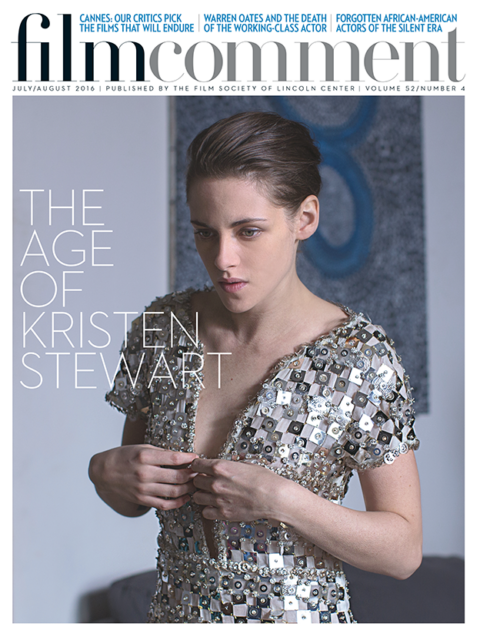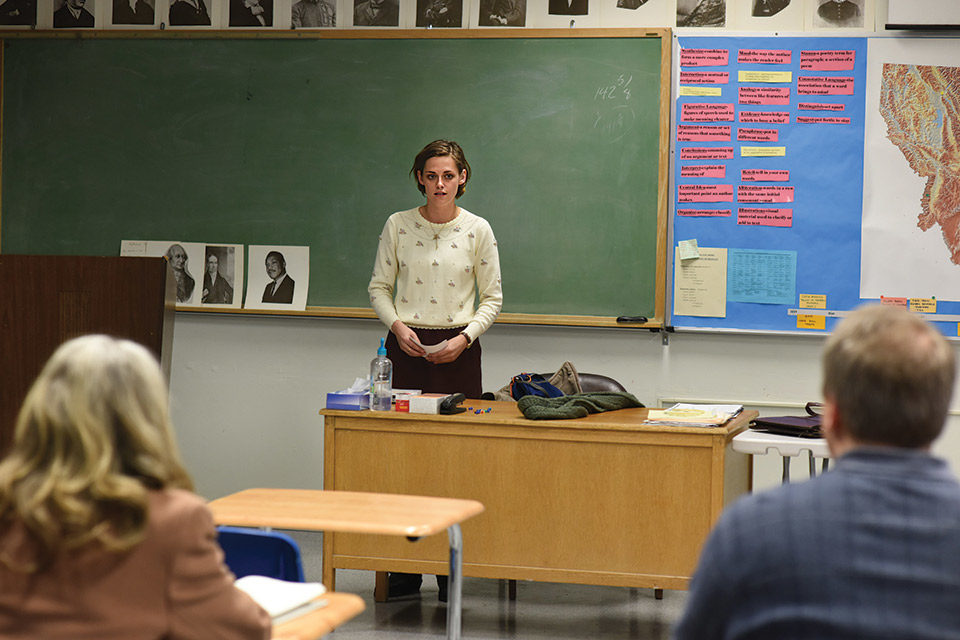By Nick Davis in the July-August 2016 Issue

Hiding in Plain Sight
The casual complexity and low-key intensity of Kristen Stewart
Recently, some epigrammatist on Twitter pronounced: “I love Adele, because you feel like she could be anybody. I hate Katy Perry, because you feel like she could be anybody.” How might this commentator assess Kristen Stewart, another superstar consecrated by the same generation of pop consumers, tilting young and female? With her frank and frequently neutral gaze, her stammers and trapezoidal slouches, her quick and casual diction, Stewart’s performance style is even more quotidian than Adele’s virtuosic channeling of universal laments or Perry’s lavishly synthetic shtick as the roaring Everygirl.

From the July-August 2016 Issue
Also in this issue
Such apparent lack of varnish, echoing Stewart’s mellow personality, has made her a polarizing performer. While she has enticed advocates throughout her career, probably neither her Twilight (08) fans nor high-placed devotees like A. O. Scott of The New York Times predicted her recent spike in critical cachet. Two years ago, Stewart premiered new films in three major festivals: at Sundance, Camp X-Ray (14), as a female guard at Guantánamo who develops a vexed sympathy with a male detainee; at Cannes, Clouds of Sils Maria (14), as the assistant who coddles and needles the star thespian played by Juliette Binoche; and at Toronto, Still Alice (14), as the prodigal daughter of Julianne Moore’s fading Alzheimer’s patient. Each movie elicited considerable praise, as did Stewart’s contributions, culminating in several U.S. critics’ prizes for Clouds of Sils Maria and her breakthrough as the first American actress to win a César, France’s equivalent of the Oscar.
Now, two years later, Stewart has sustained similar feats. Kelly Reichardt’s ensemble drama Certain Women impressed Park City, with Stewart drawing good notices as a night-class instructor befuddled by one student’s wide-eyed reverence. At Cannes, she headlined both the opening film, Woody Allen’s ’30s-set dramedy Café Society, and a buzzy Competition entry, Personal Shopper, a tender yet terrifying story of grief, covetous desire, and signals from the afterlife. Olivier Assayas, who also guided Stewart through Sils Maria, built the newer movie more tightly around his still-rising star and won a Best Director award. If anything, her reviews were stronger than his, yet even effusive responses to Stewart sometimes credit her achievements to others, her concise but nimble artistry registering as serendipity, careful management, or late-breaking surprise.

Certain Women
Café Society finds Stewart making forays into comedy, pastel palettes, and period romance, and thus marks a near-antithesis to another Stewart vehicle bowing the same day in U.S. cinemas: Drake Doremus’s Equals (15), a shivery blue-and-white parable set in a world where feelings have been banished. It’s nothing new for a young female star to anchor an Allen script or a sci-fi dystopia, but these contexts ramify pointedly for Stewart. One challenges her reputation for no-frills sangfroid, while the other embeds that typecasting in its premise. Certain Women and Personal Shopper less obviously flex Stewart’s range: Reichardt’s affinity for quiet pilgrims perfectly suits this actress, and Personal Shopper, however defiantly odd in many respects, also revisits moods and tropes that Assayas and his star have explored in past projects. Far from redundant, though, these films underscore how Stewart’s consistencies are as interesting as her departures, particularly since her technique remains uncommon, her persona as elusive as ever.
If Stewart’s talents take people aback, no matter how often and variously proved, one probable reason is her commitment to a low-fuss, conversational directness that is rare among modern film performers, particularly in roles that accommodate flashier approaches. Instead, she has persuaded film culture to meet her where she lives—in a laconic, minutely expressive, barely laminated register of acting that’s confusable with “just being.” Actors and filmmakers seem inspired to emulate her non-flamboyance, rather than obligating Stewart to limber up, open out, or reveal capacities for wild emotion and strenuous articulation. I would not deny that Stewart’s abilities have deepened, but in a parallel triumph, she has stretched other people’s definitions of fluency and screen presence.
To read the full article, please purchase the July/August issue.
IN FOCUS: Café Society and Equals open July 15. Personal Shopper and Certain Women will be distributed by IFC Films/Sundance Selects.
Nick Davis is a professor of film, literature, and gender studies at Northwestern University. He also writes film reviews at www.NicksFlickPicks.com.







